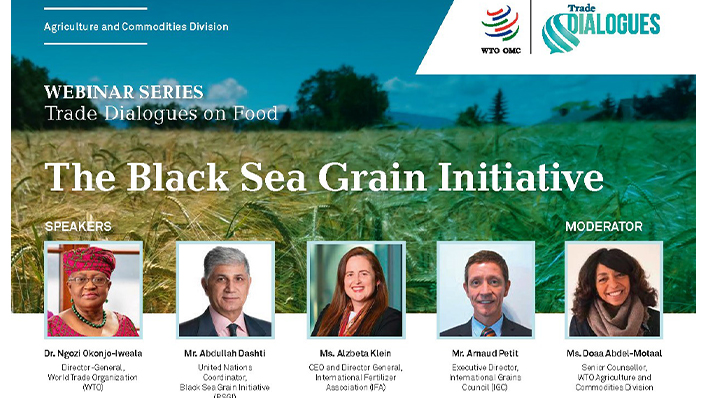
The jump in food and energy prices triggered by the war “has brought a complete new spotlight” on the issue of food security, the Director-General told participants. “Many of our developing country members, particularly the least developed countries, are on the receiving end of the crises that are happening in the world. This is something they did not cause but they are the ones who are suffering the most from the lack of access to food, from the lack of access to fertilizer, and from high prices resulting from the exchange rate movements and depreciation of currencies.”
With one in five calories traded internationally, “imagine how important the role of trade is now in order to help us solve this problem of access, of building resilience and of managing the volatility of food prices and energy prices,” she said. So “the first and best thing is keeping an open, predictable and stable international multilateral trading system. Trade has been absolutely central on the food front, and keeping a predictable, stable and fair system is key.”
WTO members have contributed to this by adopting a Ministerial Decision on World Food Programme (WFP) Food Purchases Exemptions from Export Prohibitions or Restrictions, an immediate response to the crisis in the Black Sea region. They also adopted a Ministerial Declaration on the Emergency Response to Food Insecurity at their 12th Ministerial Conference (MC12) in June 2022.
In that Declaration, members reaffirm the importance of not imposing export prohibitions or restrictions in a manner inconsistent with relevant WTO provisions. The Director-General noted that 100 export restrictions on food and fertilizer were imposed following the outbreak of the war in Ukraine but that the number of measures still in place has fallen to 63.
“This is in the right direction,” she said. ”It has helped but we can still do more. And we’re pressing on transparency and notification so we can do that.”
In addition, WTO members have adopted 80 measures that facilitate trade in food and fertilizers. “I want to give a shout out to our members because they’ve also done the right thing,” the DG said. “I’m very proud of what our members achieved at MC12 with respect to food availability. We’re in a better place than we would have been if not for those actions.”
WTO members are also seeking to advance negotiations on agriculture and place a greater spotlight on food security concerns, the Director-General noted. “If out of this we could look at food security from a fresh lens and try to pull out from the agricultural negotiations what would be most useful to boost global food supply, particularly in developing countries, that would be helpful.”
The Black Sea Grain Initiative allows for commercial food and fertilizer (including ammonia) exports from three key Ukrainian ports on the Black Sea and sits alongside the Memorandum of Understanding between the Russian Federation and the Secretariat of the United Nations on promoting Russian food products and fertilizers to the world markets. A Joint Coordination Centre (JCC) based in Istanbul coordinates the implementation of the Black Sea Grain Initiative.
Abdullah Abdul Samad Dashti, United Nations Coordinator for the Black Sea Grain Initiative, told the Trade Dialogues event that some 30.5 million tons of grains have now been exported to 45 countries through the Initiative, with priority for WFP shipments to Afghanistan, Ethiopia, Kenya, Somalia and Yemen.
This agreement has “contributed very dramatically to lowering global world prices and continues to do so,” he said.
Alzbeta Klein, CEO and Director General, International Fertilizer Association (IFA), said the Black Sea initiative “is tremendously important for global food security” and that the situation regarding fertilizer shipments has improved. Nevertheless, the affordability of nitrogen and phosphates was becoming a more general concern, particularly in sub-Saharan Africa, mainly due to the depreciation of local currencies.
“One thing that we learned over the past year is that food security, which we took for granted for many, many decades, is actually extremely vulnerable, and it’s much more vulnerable than we ever thought it was,” Ms Klein said.
Arnaud Petit, Executive Director of the International Grains Council, gave participants an overview of global market trends for rice, wheat, maize and soybeans. He underlined the importance of the Black Sea Grain Initiative for global food markets.
“The Black Sea region represents more than 70 million tons of grains every year. We don’t have another area elsewhere in the world that produces 70 million tons,” he noted. “It’s a very big matter in terms of balancing global grains markets.”
Share
Reach us to explore global export and import deals